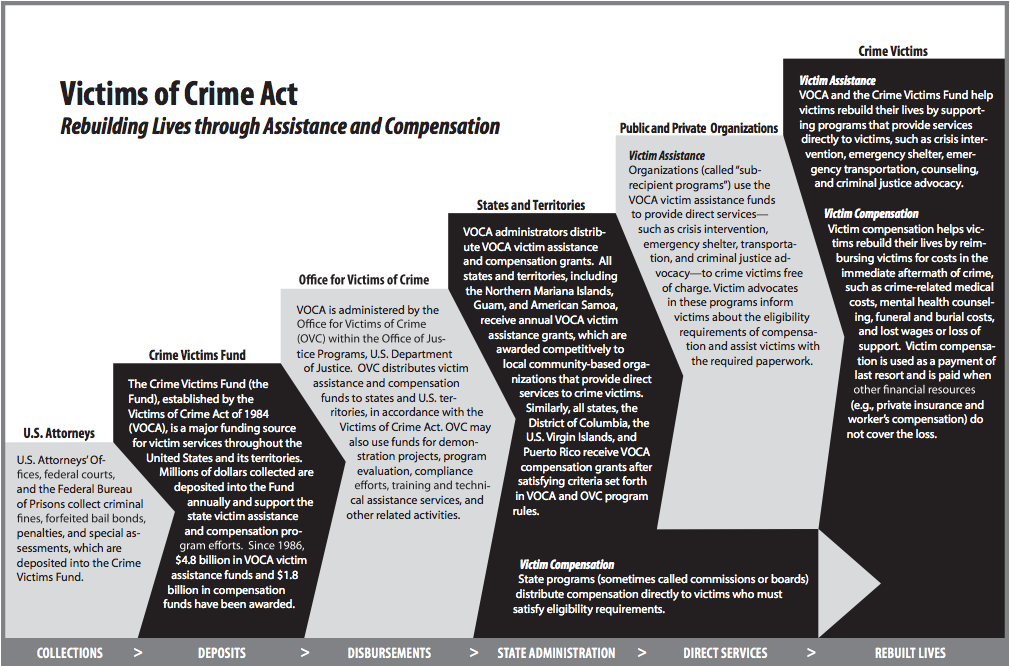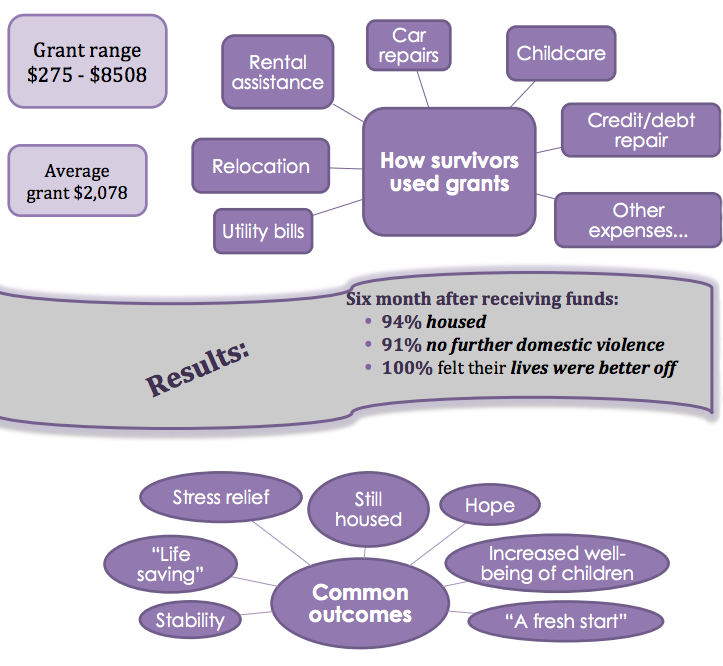The Victims of Crime Act (VOCA) has, since 1984, provided essential funding to state and local programs across the country that has enabled these programs to offer critical support services to victims of domestic violence. VOCA state assistance grants provide funding for crisis intervention, counseling, transportation, volunteer coordinators, services for elder victims and victims with disabilities, and more. We were excited to learn that the VOCA Final Regulation issued in 2016 by the Office for Victims of Crime (OVC) clarified that VOCA funds can be used to address the housing-related needs of survivors.
Under the final regulation, VOCA funding can be used to provide emergency shelter for victims of domestic violence, and to support victim-specific transitional housing programs. It can also be used for costs related to relocation, where necessary for the safety and well-being of a victim, including, but not limited to, reasonable moving expenses and travel, security deposits on housing, rental assistance, and utility startup costs.

In addition, VOCA funds may be used for training and training-related travel for both VOCA-funded and non-VOCA-funded direct service provider staff and allied professionals, as well as managers and Board members of victim service agencies. This means that domestic violence and sexual assault programs can invest in building their capacity to understand victims’ housing needs and options, as well as the homeless and housing systems in their state or community.
Now, as states across the country are beginning to significantly invest VOCA funding in responding to survivors’ housing needs, we’re seeing promising practices emerge – and hope that your program will also consider how VOCA funding can support your efforts to address this critical issue.
What is “flexible funding” to address housing instability?
One of these promising practices is flexible funding, which is a small amount of financial assistance provided to survivors to help them resolve a crisis that is interfering with their ability to attain safe, stable housing. A flexible funding grant could, for example, cover a survivor’s security deposit, or pay for needed car repairs so that a survivor can get to work and earn a living, or offset the cost of emergency relocation to a safer housing situation. Importantly, to be most responsive to survivors’ needs, flexible funding programs should be low-barrier, quickly accessed by survivors, and non-judgmental and trauma-informed.
Evaluations of programs like the Survivor Resilience Fund at the District Alliance for Safe Housing have shown that flexible funds can help survivors and their children feel better off and more hopeful. A significant majority also report no further experiences of domestic violence since receiving their flexible funding. Flexible funding coupled with brief advocacy can be a great option for survivors who are relatively stable but currently experiencing a crisis, and where this type of grant would help them retain housing not just in the short-term, but over time. Flexible funding with longer-term advocacy (such as in DV Housing First or DV Rapid Re-housing models) is also a promising approach, and further research is being done to evaluate these programs.

How can I encourage my state to support using VOCA dollars for housing and related programs?
Many states across the country – Washington, Colorado, New Hampshire, Arizona, California, to name a few – have begun leading this work and are making significant strides toward addressing survivors’ housing needs with the support of VOCA funding. Often, this work has included ongoing advocacy by state and local domestic violence organizations with the state VOCA administrator to describe the challenges survivors in the state are facing, the resources and services that programs want to be able to provide, and the ways in which housing supports and approaches like flexible funding would be beneficial.
If you’re interested in using VOCA to advance your housing-related work with survivors, reach out to your state coalition, and together you can advocate with the state administering agency. Remember that VOCA is intended to support a broad range of activities, in recognition of the diverse and varied needs of survivors, so State VOCA Administrators should be encouraged to support this fuller scope of services – particularly when housing and related resources are so critical to survivors’ safety and well-being.
Where can I learn more about housing for survivors and flexible funding, or get support or TA for my program or coalition as we take on this work?
Visit the Safe Housing Partnerships website to access a comprehensive collection of resources, information, and tools on the intersection of domestic violence, housing, and homelessness, promising practices, program evaluations, and much more. The website also includes a section on flexible funding and other innovative approaches to responding to survivors’ housing needs.
You can also contact the Domestic Violence and Housing Technical Assistance Consortium, which is available to provide individualized technical assistance and training to communities interested in expanding the array of safe housing options for domestic and sexual violence survivors. The Consortium can also provide support to domestic and sexual violence advocates, homelessness and housing providers, and other allied providers interested in building stronger community collaborations.
The Consortium, launched in 2015, provides training, technical assistance, and resource development at the critical intersection of homelessness and domestic violence and sexual assault. Funded by a partnership between the U.S. Department of Justice, the Department of Health and Human Services, and the Department of Housing and Urban Development, the Consortium supports a TA team of four national organizations: Collaborative Solutions, the National Alliance for Safe Housing, the National Network to End Domestic Violence, and the National Resource Center on Domestic Violence. The Consortium works collaboratively to improve policies and practices that strengthen efforts to build safe and supportive housing options for domestic and sexual violence survivors.
Victims of Crime Act: Rebuilding Lives through Assistance and Compensation graphic
Using Flexible Funding to Prevent Homelessness of Domestic Violence Survivors graphic














